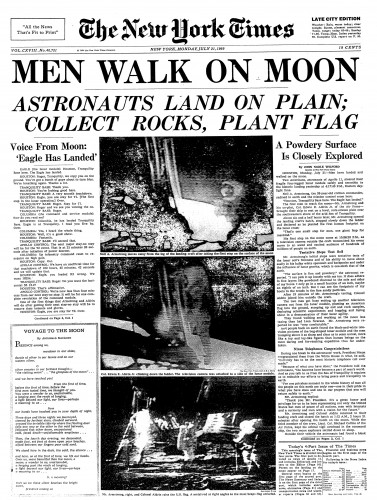This post first ran in 2013.
I died a little inside when I heard about the recent Today Show interview in which Jeff Bezos said, “I think printed newspapers on actual paper may be a luxury item. It’s sort of like, you know, people still have horses, but it’s not their primary way of commuting to the office.” As founder of Amazon.com and the new owner of The Washington Post, Bezos’s opinion on this matters. (Disclosure: I write a health column for the Post.)
I’m no luddite. I read Bezos’s comment on Twitter. I own two Kindles, and more than once, I’ve pulled up an electronic book on my iPhone while standing in line at the grocery store. I understand the convenience of reading news electronically — the news arrives instantly, snow or shine, it fits in your pocket, and there are no recyclables piling up on the kitchen table.
Like most of my peers, I read news online, but I still have three newspapers delivered to my house — the local daily, the weekly paper covering my rural county, and the Sunday Denver Post, which I read daily until they stopped delivery in my part of the state a few years ago.
Reading the newspaper has been my morning ritual since I could read, and online news has yet to replicate the experience in a satisfying way. I know what all you 20-somethings are thinking — oh, another curmudgeonly rant about new technology — tl;dr. And it’s true that I’m nostalgic for a way of delivering news that’s probably hopelessly impractical in the digital age.
A story in newsprint has a genuine quality to it — a paper’s signature columns and font make the words seem weighty and bona fide. It exists in the physical world, not just the cloud.A newspaper clipping can survive 100 years inside someone’s desk drawer or a shoebox in the attic, but the fate of our digital files seems less certain. Not so many years ago, someone advised me to back up my digital files on floppy disks and put them in a safety deposit box. Today, I would have a hard time accessing such files, but I can still read newspaper stories my mother clipped decades ago.
But what I mourn about newspapers is more than just their visceral pleasure. It’s the sense that I’m holding in my hands the news of record — the same accounting of events that my neighbors and friends are reading too. We may not always agree with the newspaper’s decisions about what to cover or how, but our sense of what’s happening in our community begins at a common place, one that attempts to provide an objective report. Of course you can also get this by reading the paper online, but on the internet you have more opportunities to seek out stories you want to read and skip the ones that are boring but important.
A newspaper’s layout is arranged according to a system in which editors determine each story’s significance and place it accordingly. This doesn’t mean that readers must agree with their judgment, but that, too, is part of the newspaper’s tradition — to give morning readers something to write in to complain about — “You call this a front page story?!”
When you see something on A1, above the fold, you know that it’s the day’s top story, not because it’s the one the most readers will read, but because it’s actually newsworthy and significant. Yes, this also happens to some extent online, but there the stories are increasingly arranged by algorithms that feed you content based on your previous clicks. Sections become products tailored to individual taste, rather that a hallowed place of common civic discourse.
In an informal poll of my friends, I was surprised to discover how many of them don’t read a paper on newsprint. I was less surprised to find that newsprint reading tracks with age. A friend in her late 20’s, told me she’d never had a newspaper delivered to her home, and I couldn’t help but feel sad for her. I realize that this sort of nostalgia strikes any person who finds a favorite object becoming obsolete, and I’m resigned to the fact that newsprint is on its way out. But I refuse to be happy about it.
My local paper has shrunk so much that it’s now only two sections — news and sports, plus a thin classifieds section. The sports section is often the fattest one. My husband and I joke about how quickly we get through the paper most mornings, but we have no plans to abandon our subscription. We could read the news on our various devices at the breakfast table, but then it would cease to be a shared experience. When you read news online, you may begin at the same newspaper site, but before you know it, you’ve wandered somewhere else, as you follow some thread of interest to wherever it leads you on the internet. I like the intimacy and satisfaction of passing the newsprint sections back and forth, discussing (or ranting) about the stories we’ve both just read. When we’re done, we crumple the paper into kindling for the wood stove that warms our house. And that’s one function online news will never replace.
______________